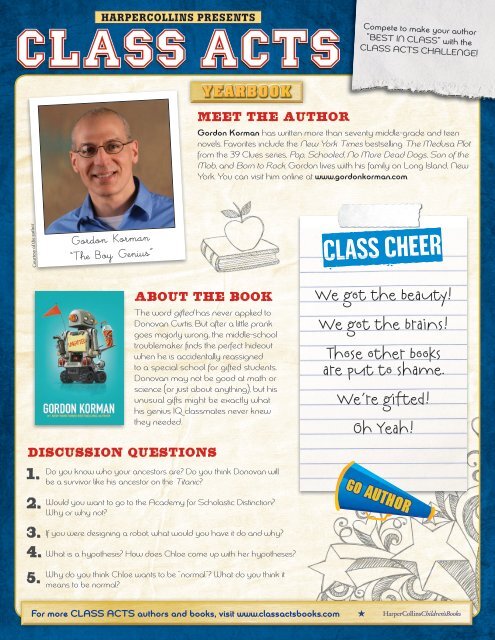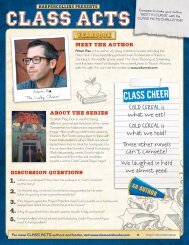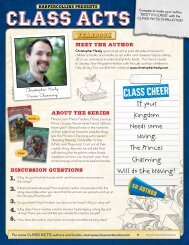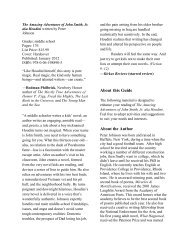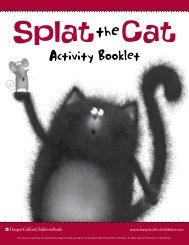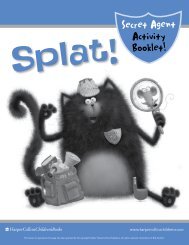Gordon Korman - HarperCollins Children's Books
Gordon Korman - HarperCollins Children's Books
Gordon Korman - HarperCollins Children's Books
- No tags were found...
You also want an ePaper? Increase the reach of your titles
YUMPU automatically turns print PDFs into web optimized ePapers that Google loves.
HARPERCOLLINS PRESENTSAUTHORS IN THE CLASSROOMHOW MANY CLASS ACTS BOOKS HAVE YOU READ?❑ ❑ ❑ ❑❑ ❑ ❑ ❑❑ ❑ ❑ ❑For more CLASS ACTS authors and books, visit www.classactsbooks.com
GORDON KORMAN
Balzer + Bray is an imprint of <strong>HarperCollins</strong> Publishers.UngiftedCopyright © 2012 by <strong>Gordon</strong> <strong>Korman</strong>All rights reserved. Printed in the United States of America.No part of this book may be used or reproduced in any manner whatsoeverwithout written permission except in the case of brief quotations embodiedin critical articles and reviews. For information address <strong>HarperCollins</strong>Children’s <strong>Books</strong>, a division of <strong>HarperCollins</strong> Publishers,10 East 53rd Street, New York, NY 10022.www.harpercollinschildrens.comLibrary of Congress Cataloging-in-Publication Data<strong>Korman</strong>, <strong>Gordon</strong>.Ungifted / <strong>Gordon</strong> <strong>Korman</strong>. — 1st ed.p. cm.Summary: Due to an administrative mix-up, troublemaker DonovanCurtis is sent to the Academy of Scholastic Distinction, a special school forgifted and talented students, after pulling a major prank at middle school.ISBN 978-0-06-174266-8 (trade bdg.)ISBN 978-0-06-174268-2 (lib. bdg.)ISBN 978-0-06-224007-1 (Scholastic ed.)[1. Behavior—Fiction. 2. Middle schools—Fiction. 3. Schools—Fiction. 4. Gifted children—Fiction. 5. Robots—Fiction. 6. Robotics—Fiction. 7. Humorous stories.] I. Title.PZ7.K8369Un 2012 2012008408[Fic]—dc23CIPACTypography by Erin Fitzsimmons12 13 14 15 16 CG/RRDH 10 9 8 7 6 5 4 3 2 1❖First Edition
8DONOVAN CURTISIQ: 112Iwant a refund from ancestry.com.They traced my family all the way back to therevolution. And in all those forefathers and foremothers,aunts, uncles, and cousins, there was nobodylike me. No bigmouth hung for treason; no “classeclowne” who they stuck in the stocks and threw rottenvegetables at. The closest match was this guy inthe Civil War who jumped off a battlement, whateverthat is. And he only did it because the Union army1
was firing on Fort Sumter. That’s what they put onhis tombstone anyway. It sounds like a pretty goodexcuse to me.I did things like that. If there were any battlementsin my neighborhood, I’d probably jump off them all.And not because of any army. I’d do it just to see whatwould happen. “Reckless,” my mother called me.“Poor impulse control.” That’s the school psychologist.“You’re going to break your idiot neck one day,or someone’s going to break it for you.” My dad.He was probably right. They were all right. Butwhen the thing is right there in front of me, and Ican kick it, grab it, shout it out, jump into it, paint it,launch it, or light it on fire, it’s like I’m a puppet on astring, powerless to resist. I don’t think; I do.It can be little things, like throwing darts at a poolfloat to test my sister’s swimming skills, or spittingback at the llamas at the zoo. It can be more creative—ahelium balloon, a fishhook, and Uncle Mark’s toupee.It can even be the smart-alecky comments that got mevoted Most Likely to Wind Up in Jail in my middleschool the last two years running.“Our fans are great; our team is nifty! We’re goingto get blown out by fifty!”See, that was probably not the wisest thing to say2
on the day of the big game against our basketballarchrivals, Salem Junior High. But I didn’t just say it;I broadcast it over the PA system to the entire school.I don’t know why I did it. The cheer was already fullyformed in my mind—the poster advertising the biggame had planted it there. It was definitely going tocome out. Why share it with only the two Daniels,who were with me in the office awaiting sentencefor our spitball war, when there was a perfectly goodmicrophone a few feet away, unattended and live.Okay, it wasn’t live. I had to flick the switch. I evenhad pom-poms—well, a crumpled piece of paper forsound effects.The howl of protest that went up all around thebuilding surprised even me. It was like I’d gonefrom house to house, poisoning everybody’s dog. Itwas probably for my own good that I wound up indetention. If I’d been free in the halls at three-thirty,I would have been lynched. The sense of humor atHardcastle Middle School didn’t extend to their preciousbasketball team.“Why’d you say we’re going to lose, man?” askedWhelan Kaiser, starting center, peering down at thetop of my head from his six-foot-four vantage.Why? There was no logical explanation for what3
I did. It had to come from my DNA. That’s why Ineeded ancestry.com.I was the only kid in detention that afternoon. Allcrimes had been forgiven in order to pad the audiencefor the big game against Salem, which had to havealready started. All crimes except mine—dissing thebasketball team. Even the Daniels—two-thirds of thespitball war—had been cut loose while I was doingtime.The Daniels weren’t at the game. I knew this becausethey were skulking in the bushes outside the detentionroom, making grotesque faces at me through thewindow. If they could make me laugh—and it wasn’teasy to hold back—I’d be in even more trouble. As itwas, Mr. Fender was checking his watch every thirtyseconds. He wanted to be at the game, not babysittingme.Finally, he could bear it no longer. “I’ll be rightback,” he told me sternly.The instant he was gone, the window was flungopen from the outside.“Come on!” hissed Daniel Sanderson. “Let’s get outof here!”“He’s coming back,” I protested.“No, he’s not,” scoffed the other Daniel—Daniel4
Nussbaum. “He’s going to the office to watch the feedfrom the security camera in the gym. You’ve only gotten more minutes. If he’s any kind of basketball fan,you’re golden.”I was out the window like a shot, breathing sweet,free air. See what I’m saying? The open road called,and I took it. This time I’d needed a little help. That’swhere the Daniels came in. They helped me a lot.They’d helped me to the office with our spitball fight,and helped me to the PA mic by daring me to do it.With friends like them, sometimes I wondered why Iwould ever need enemies.I turned on them. “Thanks for letting me take thefall alone. Your support was really touching.”Nussbaum shrugged innocently. “I couldn’t takecredit for your poem.”“It wasn’t a poem. It just happened to rhyme.”“I’ve been meaning to talk to you about that,” Sandersonput in. “Don’t you think that’s kind of dorky? Imean, who rhymes anymore?”“Nobody,” I conceded, “except the entire hip-hopcommunity.” I bounced a pinecone off his head, whichonly made him grin wider.We were at the top of the hill, looking down on thegym we shared with Hardcastle High. The parking5
lot was jam-packed. A roaring cheer spilled out of thebuilding.“Man, you couldn’t fit a Hot Wheels car in there!”Nussbaum exclaimed, taking in the crowded lot.“Salem-vs.-Hardcastle is the place to be.”“Let’s go check out the score,” said Sanderson. “Wecan see if our ‘nifty’ team will lose by ‘fifty.’”“Yeah, Donovan, nice school spirit,” Nussbaumadded. Like he had any.We started down, the Daniels jostling each otherabsently. A kind of friendly belligerence came naturallyto those two. Maybe they were descended fromthe Hatfields and the McCoys. I’ll bet the Daniels hadnever checked it out on ancestry.com.And then The Moment was upon me.I must have passed the statue of Atlas a thousandtimes going back and forth on the campus of theHardcastle Public Schools. Yet somehow it was likeI’d never seen it before.It was not the titan’s broad powerful shoulders supportingthe bronze globe of the world and heavensthat seemed so different. But since when did Atlashave such a big butt? Seriously, I knew he was a titan;but I didn’t know that the most titanic thing about6
him was his caboose. He looked like a reject from TheBiggest Loser.Suddenly, I was striding toward the statue, in analmost trancelike state. I picked up a fallen tree branchand made my approach.Nussbaum noticed my zombielike concentration.“Dude, what are you doing?”I didn’t answer, and he didn’t really expect me to.He knew me. They both did.I cocked back the branch, and unloaded a home runswing. The impact vibrated up through my arms tomy brain stem, and into every cell of my body. Thebranch shattered in my hands.I have to say that this was always the best part of itfor a guy like me—the split second the tomato hitsthe car; the very brief flight as I drop from the edgeof the roof to the pool; the instant that the balloonlifts the toupee and the sun’s rays glint off that shinybald head.Or, in this case, the go-o-o-ong! sound from thestatue’s bronze behind. The payoff. It was usuallydownhill from there. Sometimes literally.Atlas shivered as the vibration traveled through hismetal body. The celestial sphere shivered too, rocking7
expect to see was a giant metal ball blasting into thegymnasium, scattering players like tenpins. Not onlydid it create a dangerous situation, but it also reflectedvery badly on the Hardcastle schools.Miraculously, no one was injured. Still, there was alot of chaos as the parents of the players rushed to theirsons on the floor in an effort to protect them fromwhatever this onslaught was.I knew instantly. That globe was part of the statue ofAtlas that stood on the knoll overlooking the school.And it certainly hadn’t rolled itself down to the gym.I raced through the shattered door and onto the lawn.I could see the ribbon of crushed grass all the wayback to the figure of Atlas, who looked peculiar, bentunder the weight of absolutely nothing.The culprit lay in the flattened path, raised up on hiselbows, staring at the damage, guilty. “You, there!” Icalled.The boy tried to scramble up and run, but he couldn’tget any traction on the squashed turf. By the time hefound his feet, I was upon him, and he was caught.“Come with me to my office.”His shoulders slumped. “Yeah, okay.” He lookedas worried as he ought to be. I drew some small12
mind that her husband was in a risky line of work.Mom came over and placed her hands reassuringlyon Katie’s shoulders. “Brad’s surrounded by the besttrainedpeople with the best equipment money canbuy.”But her daughter’s mind turned out to be elsewhere.“Beatrice is coming.”“Beatrice?” Mom echoed. “You mean Brad’s dog?I thought she was staying with your mother-in-law.”“She was,” Katie explained miserably. “But Fannycalled me this morning. She said she can’t cope, andshe’s coming this afternoon to drop off Beatrice.”“We’re getting a dog?” I asked, mildly interested.“That mutt hates me,” Katie moaned. “That’s thereason she was supposed to go to Fanny in the firstplace. Beatrice will never forgive me for taking herplace in Brad’s life. For all I know, she blames mefor getting him shipped out. Like I make deploymentdecisions for the Marine Corps.”“She’s your dog too, Katie,” Mom lectured. “Andwe’d be delighted to take care of her while Brad’sserving his country. Right, Donnie?”“I’m not touching the poop scoop,” I said firmly.My mind was on Schultz, not dogs, that morning.At school, I waited to be called to the office. Between19
classes, I searched for the summons taped to mylocker. Nothing. The anxiety was eating me up fromthe inside. When the PA announcement finally came,it was almost a relief.“Would Donovan Curtis please come to the office?Donovan Curtis to the office.”It was the longest walk I’d ever taken. At each opendoor, hostile faces glowered out at me. Remember, Iwas still the guy who disrespected our beloved basketballteam. When the news got around that I wasalso responsible for unleashing the runaway globe thatbowled out the gym, I was really going to be PublicEnemy Number One.At last, I rounded the corner, and the glassed-inreception area came into view. To my surprise, theavenging angel waiting for me was not Dr. Schultz,but Mr. Fender.“When you serve a detention with me, Mr. Curtis,you serve it to the end. And you don’t leave until I tellyou it’s time. . . .”He went on for a while, trying to scare me, I guess.The poor guy had no way of knowing that, consideringthe payback I was expecting from Schultz, arampaging grizzly couldn’t scare me. He cut me loose,though, explaining that, thanks to the damage to the20
gym, we students had “suffered enough.”I had a sneaking suspicion Schultz wasn’t going tosee it that way.I couldn’t say how much anybody had actuallysuffered, but the disaster at the basketball game wasdefinitely the hot topic at school.“When the glass blew out, I thought it was an explosion!”“Like a terrorist attack!”“Did you see the statue with the top part missing?It looks like my grandfather when his back goes out!”“I heard the gym floor is permanently messed up!”“When they catch the guy who did it, they’re goingto hang him on a meat hook!”“Yeah!” Nussbaum chimed in. “I pity that poorloser! His life isn’t worth a used Kleenex!” He turnedto me. “So, Donovan, when do you think you’re goingto get busted?”“Shhh!” I pulled the Daniels into the boys’ room,and checked the stalls for possible eavesdroppers.“This is no joke! The walls have ears!”“Dude.” Nussbaum was offended. “We’d never ratout a friend.”“Listen, that call was a false alarm—just Fender forskipping out of detention. I don’t understand why21
Schultz hasn’t come after me yet.”“Maybe he doesn’t know who you are,” Sandersonsuggested.I shook my head. “He wrote down my name. I toldhim where I go to school. He’s the superintendent.He’s got access to every file and record there is.”“Yeah, did you pick the wrong guy to get caught byor what?” Nussbaum agreed. “The head honcho ofthe whole district.”“I’m wondering if it’s not as bad as it looked,” Imused in a low voice. “A little cleanup, a little woodpolish—”“I heard they’re going to have to redo the wholegym floor,” Sanderson put in. “It costs, like, zillionsof dollars.”“And don’t forget the glass doors,” Nussbaum added.“You’re a dead man walking.”I totally agreed. So why wasn’t it happening? All daylong, and the following days too, I squirmed whilerumors spread like head lice and the Daniels predictedmy downfall. There was no escape from the tensionat home, where reports of firefights in Afghanistandominated CNN. Then, on Wednesday, Katie’smother-in-law dropped off the dog.The times I’d seen Beatrice, she was a rocket-powered22
hairball. But the cinnamon chow chow that slunk intoour house was listless and mewling.“What’s wrong with her?” Mom asked.“She’s dying!” Fanny declared dramatically, andtried to walk out the door.Katie held on to her arm. “How do you know? Didshe get hit by a car? Is she sick?”Her mother-in-law wasn’t interested in the details.“I can’t cope with this at my age!” And with that, shewas gone.Mom reached down to pat the dog. Beatrice snappedat her hand. She tossed a warning growl over hershoulder at Katie, just in case she might be contemplatinga similar move.“She’s too mean to die,” I observed.“She can’t die,” Katie said tragically. “Brad lovesher.”“Brad loves you, too,” I returned. “What does thatsay about Brad?”“He’ll never forgive me if something happens toher!”“Well, that’s not exactly fair, is it?” Mom put in. “Ifanything went wrong, it was on Fanny’s watch, notyours.”“That’s her whole modus operandi,” Katie argued.23
“The minute she saw the writing on the wall, shedumped the dog on me! And how can we take care ofBeatrice if she won’t even let us go near her?”As if in answer, Beatrice picked herself off the floor,walked over to me, and lay down on my feet.“Donovan!” my mother exclaimed.“What did I do? I didn’t do anything!”“Beatrice likes you!” Katie said in an awed whisper.“So?”“So you can look after her,” Mom reasoned, like thiswas a huge honor.I declined. “Forget it. Besides, if Brad is such a babyabout Beatrice, you have to wonder if he’s the rightperson to be in charge of a twenty-million-dollartank.”But when Beatrice refused to eat, I had to hand-feedher a few lumps of liver-flavored kibble. When it wastime to take her out, I was the only one she wouldallow to put the leash on. When Katie made her a bedin the basement, she wouldn’t even go down the stairs.I knew I was going to have a roommate. Just call meDog-Whisperer Donovan. As if I didn’t have enoughhassles.Dad came home at six, bringing the mail. “There’s aletter from the school, Donnie. Is there anything you24
want to tell us before we open it?”By that time, my tongue was stuck to the roof of mymouth, so I just shook my head and waited for the axto fall.Who knew how much trouble I was in? Suspended?Probably. Expelled? Not out of the question—especiallysince Schultz thought I’d done it on purpose. Ihad done it on purpose—the hitting-the-statue part,anyway.While Dad read, I monitored the telltale vein inthe top left corner of his forehead. It bulged a little,but not nearly as much as it had during the aftermathof the toupee liftoff. That had to be considered anencouraging sign.At last, he handed me the letter. “You have an explanationfor this?”“I—I—” Where would I even start?My eyes fell on the page.To the parents of DONOVAN CURTIS:The time has come to recognize your child’s hard workand commitment to excellence as a student in theHardcastle Independent School District. This letter isto inform you that DONOVAN has been selected toattend the Academy for Scholastic Distinction (ASD),25
a special program geared toward gifted and talentedstudents, tailored to their exceptional abilities andextraordinary potential for academic achievement. . . .It said more—a lot more, about school transfer paperwork,and registration forms, and which bus routewould take me to my new placement at the Academy.I barely saw any of it. My eyes couldn’t get past wordslike excellence, distinction, gifted, and especially DonovanCurtis.Gifted? Me? I was the guy who skateboarded downwaterslides and shot a Super Soaker at an electric fence.When people heard my name, they thought, Don’t trythis at home! not gifted.I wasn’t being expelled; I was being promoted.Dad was grinning from ear to ear. “I always knewthat the real problem was they just weren’t challengingyou.”Mom looked worried. “Is everything okay?”“Donnie’s gifted!” Dad crowed.“It’s a mistake,” Katie scoffed. “The kid’s about asgifted as a caterpillar. He brings home a B and it setsoff six days of skywriting and fireworks.”Much as I hated to agree with Katie, she had a point.My grades weren’t terrible, but they were nothing to26
write home about. Come to think of it, I rememberedthe day all the nerds and brainiacs took the specialaptitude test to see who got into the gifted program. Iremembered it because nobody even asked me to giveit a try. And I wasn’t insulted because I wasn’t gifted.My eyes skipped down to the bottom of the page.My heartiest congratulations once again. Your child is acredit to the Hardcastle Independent School District.Sincerely,Dr. Alonzo SchultzSuperintendent, HISDSchultz.The only program Schultz would recommend me forwas Alcatraz. Didn’t he realize who I was? I mean, theguy made a point of getting my name so he’d knowexactly who to burn at the stake!It came to me in a giddy flashback to the day of TheIncident. Right after Schultz let me go, his secretaryasked for the roster of new kids for the Academy. Thesuperintendent’s response was the last thing I rememberbefore bouncing out of there.His exact words: “It’s on my desk, Cynthia. Youcan’t miss it.”27
Had that big doofus scribbled my name on the giftedlist by accident? And everybody else thought it wasthere because it was supposed to be? It seemed crazy,but it did explain the two inexplicable things going onin my life right now: 1) why Schultz hadn’t come tokill me yet, and 2) why I’d just been invited to go togenius school.I laughed out loud. People thought I acted withoutthinking? This was a thousand times worse thanhitting a statue with a twig. It was a shoo-in for theBonehead Moves Hall of Fame!“What’s so funny?” Dad asked.I almost spilled the beans. How many chances doyou get to show that the guy who runs the entire cityschool system is an even bigger dipstick than you are?Besides, it’s not like my parents weren’t going to findout eventually. Sooner or later, Schultz would realizehis mistake and . . .Or would he? The only district officials who sawme that day were Schultz and his secretary, and neitherof them had ever met me before. They workedin the administration building, not Hardcastle MiddleSchool. The paper my name was written on was surelygone now, crumpled up in a wastebasket or fed througha paper shredder. The one thing the superintendent28
knew about me was the school I went to. That was theonly way he could get to me.The gifted letter tingled in my hands. If I was at theAcademy, he wouldn’t be able to find me. It was therealm of brainiacs and goody-goodies, the last placeyou’d look for a kid who put a bronze globe througha glass door.A tiny voice spoke up from the depths of my spleen:Forget it. Not in a million years. You won’t last ten minutesin the gifted program. There’s never been anybody moreungifted than you.Mom was flushed with happiness. “I always knewthis day would come. It was only a matter of timebefore people realized how special you are.” Shesniffed back a tear of emotion. “Beatrice was our goodluckcharm. Things are finally starting to turn aroundfor this family. I can feel it.”“I feel it too,” added Dad, putting his arms aroundher. “Wait a minute—Beatrice?” His eyes strayed tothe hall, where the languid chow chow was chewingon his newspaper, reducing it to an inky pulp.Up until that instant, I honestly don’t think I wasgoing to go through with it. But since Brad hadshipped out and Katie had moved back in, the tensionin our house had been simmering just below29
the boiling point. And now this extra stress with thestupid dog. How could I pile my own problems ontop of that? Especially when Mom and Dad lookedso proud—something that didn’t happen every daywhere I was concerned.I thought of my namesake, James Donovan, on thefoundering Titanic. What would he do—sink or swim?“Gifted,” I said a little louder, as if trying it on forsize. “I guess I’d better go to school and clean out mylocker.”30
uCHLOE GARFINKLEIQ: 159Okay, I know it’s not a real hypothesis—by that, Imean something you can design an experimentto test. But it’s true. There’s a price to being gifted.The cost is your life. You don’t die or anythinglike that. But you don’t live either. Free time? Forgetit. You go to a special academy that gives you extrawork to suck up every spare minute—especially since31
it probably takes forever to get there. Schools for thegifted are few and far between. Chances are you don’tlive near one. Friends? Those are the people you slavealongside. They might be awesome, but how wouldyou ever find out? You’re too busy for them, andthey’re too busy for you. Sports? When? And besides,why play when you probably stink?What about TV or video games? Oh, please. You’refar too smart for that. Pep rallies? For what—therobotics team? Forget it—and the same goes for schooldances, funny-hat day, drama club, charity drives. . . .“Dances?” repeated Abigail Lee when I broughtup the subject in homeroom. “Who do you want todance with? Him?” She pointed at skinny, needlenosedNoah Youkilis.She had a point. Most of the guys at the Academyfor Scholastic Distinction weren’t exactly whatyou’d call Hollywood hunks. I didn’t expect bodybuilders,but it would be nice if they could growa set of shoulders between the lot of them. And itwouldn’t hurt to spend a little time outdoors to put32
some color in those prison-pale faces.Then again—being smart requires you to examinethings from all sides—why pick on the guys? We girlsweren’t exactly homecoming queens either. Abigailwas a genius biochemist, but her greatest fashion statementwas her white lab coat. She looked like she hadn’tcombed her hair since 2007. Or me, for that matter.I’d scored a perfect 2400 on every SAT practice testsince sixth grade, but who was I to talk? Here I was,almost fourteen, and I’d never danced with a guy whowasn’t related to me. I’d never been to a party exceptfor kiddy things with balloons. I wasn’t going on thecover of Seventeen anytime soon, that was for sure.“Okay, so it doesn’t have to be a dance,” I told Abigail.“But why can’t it be something? Every day millionsof kids around this country do millions of normalactivities, and they have a great time at it. Why can’twe?”“The statewide robotics meet is coming up,” sheoffered.Sigh.I took robotics. I was good at it. I was good at all ofit. I totally belonged at this school. But why did it have33
to mean that I couldn’t be a regular person too?Mr. Osborne, our homeroom teacher, who was alsohead of the robotics program, breezed into the lab.“Let’s hurry up and take attendance. We’ve got a lotto do today.”We were all there. Where else would we be? Wewere any teacher’s dream, yet at that moment it mademe sad. I had no desire to cut class—but maybe thatwas the problem. When was the last time one of usbroke the rules? This morning, while checking onmy experiment in the growth of hydroponic flax,I’d noticed the paper I’d taped to my desk lamp toconcentrate the beam onto the seedlings. It was a certificateof merit I’d received for perfect attendance atschool. I’d earned seven of these over the years, andwhat use were they to me? Makeshift lampshades.When was the last time anybody even showed uplate?“Sorry I’m late.” A tall sandy-haired boy appeared atthe door. “Is this Mr. Osborne’s class?”“This is the robotics lab,” the teacher replied. “Andyou are?”“Donovan Curtis,” the newcomer replied, waving a34
printed form. “I’m supposed to be in this homeroom.”“Right—our fresh blood from Hardcastle Middle.”Oz accepted the paper and examined it.Abigail leaned over to me. “That can’t be right! He’scoming to this school?”I was intrigued. “You know him?”“We went to the same elementary. He’s the kid whojumped off the roof with one of those Gymboreeparachutes.”I sized him up. He was kind of cute in a careless,windblown way. Great eyes—black fringed, pale blue.“Well, he must be smart if he passed all the tests to getin here.”Abigail was unconvinced. “Maybe. But he wouldhave had to change a lot since I knew him.”I bit my tongue. Okay, so Abigail thought he wasdumb, but next to her, everybody was dumb. I wasprobably pretty dense compared with her. If DonovanCurtis didn’t measure up to Lee standards, that hardlymade him stupid. There were no dim bulbs at ourschool. But that’s not to say that we didn’t range fromsomewhat bright to superbright—and in a few cases,like Abigail and Noah, supernova.She was telling me about Donovan getting histongue frozen to a chain-link fence one winter, but35
y that time I’d stopped listening. I’d never met thisnew kid, but I already had him perfectly sized up inmy mind.Donovan Curtis was normal.Normal! We had a lot of talents in our homeroom.Normalcy wasn’t one of them. Noah’s IQ was offthe charts, but he’d yet to hold a conversation witha real human being this year. Most of the time, hedidn’t even make eye contact. He always seemed tobe speaking to the empty space over your left shoulder.Or Jacey Halloran, who had already discoveredan uncharted galaxy, but still couldn’t figure out howto open a combination lock. Or Latrell Michaelson,our mechanical marvel, who took cars apart and putthem together again blindfolded—for fun. He couldn’tmanage to wrap his mind around the fact that he hadto wait in the food line to buy his lunch. Every singleday was World War Three in the cafeteria.We had kids who had set academic records, andpublished books, and won every conceivable prize andhonor. We had kids who could quote you the exactline of dialogue that’s spoken 94 minutes and 30 secondsinto The Matrix or Return of the Jedi.What was missing was somebody—anybody—normal.36
“I am the great and powerful Oz,” Mr. Osbornetold the newcomer in a mystical tone—he said that toeverybody the first time he met them. “Technically,this is homeroom 107, but you’ve probably noticedthat it looks like a cross between a mad scientist’s lairand a garbage dump. We do robotics here. Even ifyou’re not taking robotics this semester, I hope you’llhelp out with the team. It’s a pretty big deal here at theAcademy.” He turned to the rest of us. “Guys, meetDonovan. Donovan—the guys.”There was a very lukewarm chorus of greeting.Another thing about the Academy—being giftedrarely extended to social skills. My enthusiastic “Hi!”stood out embarrassingly over the murmurs.Donovan ignored us. Instead, he faced our latestrobot, a work in progress for this year’s competition.“What’s his name?”We were all stunned.Noah spoke up. “It’s not a he; it’s an it. It’s a mechanicaldevice, and, as such, has no name.”Donovan blinked. “Robots have names. Haven’tyou ever seen Star Wars?”Was he kidding? Half of us could recite Star Wars.“We’ve been doing this for a long time,” Abigailinformed him in a superior tone. “We’ve made the37
finals three years in a row, and we did it with science,not by calling our entry Harry or Fred.”A few others spoke up in agreement. To be honest,I was on their side. The robot wasn’t a toy or pet; itwas a machine. I kept my mouth shut, though. PoorDonovan had only been in our class about thirty seconds,and we were already jumping all over him.It didn’t seem to bother the newcomer. “Okay, noname.” He turned back to the robot. “Sorry, TinMan.” Oz on the brain, I guess.He grabbed hold of one of the forks of the liftingassembly and gave it a hearty handshake. With a snap,it came off in his hand.There was nothing lukewarm about the class reactionto that. A babble of outraged accusations filledthe lab. Abigail, our team captain, was on her feetbarking, “You broke it!”Donovan tried to press the broken fork back ontothe chain drive. It clattered to the floor.“All right! Quiet, everybody!” Oz held his arms upfor order. “Donovan didn’t break anything. The componenthadn’t been attached properly.” He turned tohis newest student. “But it’s not a bad lesson for yourfirst day in the lab.”“I won’t mess with any more of your—stuff,”38
Donovan promised, chastened.The robotics teacher shook his head. “I want you tomess with stuff. This is a place of tinkering, fiddling,experimentation. But,” he added pointedly, “beforeyou touch, ask somebody.”“Especially before you touch Tin Man,” Latrelladded feelingly.“He’s a delicate piece of equipment,” Abigail pointedout. “And he’s not Tin Man.”I was fascinated. Now everybody was referring tothis array of nuts and bolts and circuits as he. Was itpossible that in not naming our robot, Donovan hadjust named our robot?Kevin Amari raised his hand. “Even though he’s notTin Man, is it okay if we call him Tin Man for short?‘The robot’ is so impersonal.”“Maybe because he’s not a person!” By this time, Abigailwas gritting through clenched teeth.“He’s not actually made of tin,” Noah musedthoughtfully. “But I guess Aluminum Man isn’t appropriateeither, since he’s also made of titanium, steel,plastic, various polymers, and silicon computer chips.”“How about Metallica?” suggested Latrell.“That’s good too,” Donovan approved. “Anything39
ut ‘the robot.’ Poor guy.”“Squarepants,” Kevin offered. “You know, becausehe’s so boxy.”“Oh, perfect,” Abigail snarled. “Now all our hardwork is named after a cartoon!”“Let’s live with it for a while,” Oz put in hurriedly.“We don’t have to decide right away.”Amazing—in a few minutes we had gone from noname to three. And all because Donovan Curtis hadwalked into our school.I kept an eye on him through homeroom. Exceptfor the mishap with Tin Man—or whatever the namewas going to be—I saw no sign of the buffoon Abigailhad described. If anything, Donovan was trying to befriendly—not that he was getting very far with ourcrew. Engaging Noah in conversation isn’t the easiestthing to do under the best of circumstances. ButDonovan was asking him for advice on what to expectin some of his classes.“Well,” Noah replied thoughtfully, “math is easy,and the only thing easier than chemistry is biology ormaybe physics. Social studies—easy. And English—well, you get the picture.”Poor Donovan just stared at him. He’d probably40
spent his entire life hearing stories about the Academy’skiller courses and crushing workload. And hereNoah had dismissed them all in the space of abouteight seconds.If Donovan had inquired about unraveling thegenetic code, Noah would have said that was easy too.“Thanks, I guess,” Donovan told him. “Is anythingin this place—well—hard?”“You know what’s hard?” Suddenly, Noah’s faceflushed with emotion. “Trying to control your owndestiny. It’s not just hard; it’s impossible.”So Donovan shifted gears and talked to Latrell aboutthe robot, which also backfired. Latrell got weirdlydefensive, as if Donovan might be trying to steal hisjob as the team’s top mechanic. And Jacey became sogenuinely flustered by the newcomer’s presence thatshe asked him which of the earth’s continental plateswas his favorite.Abigail went over to Donovan and put her two centsin. “You know a Gymboree parachute isn’t the same asa real parachute, don’t you?”Well, how could I not say something? He was going41
to think we were all nuts.I caught up with him in the hall on the way to firstperiod. “Hi, I’m Chloe Garfinkle from homeroom.”I held out my hand, and he shook it lightly. Maybehe expected it to break off like that piece of robot.“Hey, don’t worry about the lift mechanism,” Isoothed. “The weakness probably came from a badweld that got jarred loose by the chain drive, or maybetoo much compression from the Bimba cylinder.”He looked blank. “What’s it for?”“Oh, the Bimba cylinder provides the pneumaticpressure—”“I mean Tin Man,” he corrected. “What does hedo?”“The robot has multiple capabilities,” I enthused.“The electric eye can navigate color-coded trackson the floor. The forks pick up inflatable rings thatthe lift mechanism places on various pegs at differentheights. And it—uh—he can deploy a mini-bot thatwill climb a pole and strike a bell at the top.”He seemed confused. “Is that how geniuses spendtheir time? Picking up toys and ringing bells?”I bristled. “You’re here, aren’t you? If being smart’ssuch a crime, you’re just as guilty as the rest of us!” He42
had no answer for that, so I went on in a calmer tone,“Noah’s the only one who’s really a genius. Except thatthe work is a little more challenging, how’s the Academyany different from Hardcastle?”He gave me a half smile. “Seriously?”“If there’s one thing we’re good at here,” I assuredhim, “it’s being serious.”“Have you ever been to Hardcastle Middle School?”he asked.“I know we probably take some things for granted—”“But they’re probably not the things you think. Ifyou want to plug in a computer, can you find an outletwith three prongs? Can you find one that evenworks? Will part of the suspended ceiling come downon your head in the middle of class? Will the cafeteriarefrigerators break, so you can’t buy lunch for a day, ora week, or a month?”“Hey, things like that happen at the Academy too,”I insisted, almost triumphantly. “Last year the freezersfailed so there was no ice for”—the wind went outof my sails as I realized how lame this was going tosound—“the sushi bar.”He nodded sympathetically. “You guys should getT-shirts made. You know: I Survived the Sushi Crisis.”43
“Hey!”“All I’m saying is that you brainiacs have a niceracket going here.”I skewered him on that point. “Don’t you mean webrainiacs? You’re one of us now.”“Right,” he agreed, flustered. “But—well, I just gothere, so you’ve been riding the gravy train longer.”“Regular school has its advantages, right?” I didn’twant to seem dorky, but I was genuinely interested.“Dances, parties . . .”A shrug.“Pep rallies, sports—the basketball team is all-city.Wasn’t there some kind of huge accident at their lastgame?”His eyes narrowed. “What do you know aboutthat?”“Everybody’s talking about it. A piece broke off thisstatue. . . .” My voice trailed off. Why did he seem sosuspicious? I was only trying to be friendly, and hewas acting like this was a CIA interrogation under hotlights.“I don’t go to that school anymore,” he said verysharply, almost like he was mad at me. “I’m too—smart.” And he stormed away, leaving me standing inthe hall with my mouth hanging open.44
It wasn’t his rudeness that struck me. It was this:Ever since I’d started at the Academy, the one thingI’d been yearning for was somebody normal. Now,finally, he was here.45


